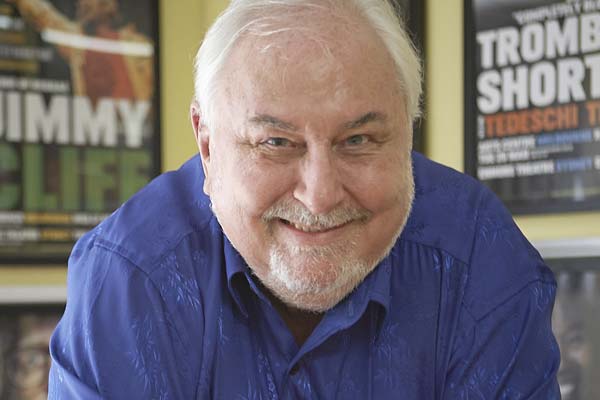There are few second chances in the festival game.
This is the lesson learnt the hard way by numerous promoters in recent years, with some of the biggest events in the country going to the wall. Even the Big Day Out — the grandaddy of Australian music festivals — hasn’t been immune, cancelled for 2015 and its longterm future in doubt.
It’s a pressure felt acutely by Bluesfest’s Peter Noble: “I’m very aware that if I delivered two badly billed events in a row, I’d either be retired or driving a taxi,” he laughs. “You don’t get to do it wrong too often. And there’s nothing wrong with that. But there is a very high expectation and if you don’t deliver, then you may end up like a Big Day Out. And who would’ve thought that was going to become a dinosaur so quickly?”
Noble is now 65. Ask how many years he’s been in the music industry and he asks back if you can count playing in bands in the local scout hall as a 15-year-old. It makes you wonder how much longer he’s willing to exist in such a tumultuous market. “I wouldn’t change it,” he says. “People go to me, 'Aren’t you going to retire?' And I’m like, ‘Why?’ I think most people who retire want to get away from what they’re doing because in the end they’re like, ‘Well, I’d rather be going to the golf course than doing that.’ But in the end I’d rather be sitting in this office working on Bluesfest than going to the golf course!”
Byron Bay Bluesfest will return in Easter for the 26th time since Peter Noble and Keven Oxford kicked off the event as a modest, focused, three-day blues and roots festival for just 6,000 people. In 2015 it will be 20,000-a-day to witness an intimidating line-up of talent. The Black Keys, Paolo Nutini, David Gray, Gary Clark Jr, Mavis Staples, Ruthie Foster, Angelique Kidjo, Zac Brown Band, Alabama Shakes, Michael Franti, Counting Crows, Mariachi El Bronx and Band of Skulls are just the tip of an artistic iceberg that is set to fill five full days of entertainment at the festival’s Tyagarah Tea Farms site just north of Byron Bay.
Perhaps most important, though, is Ben Harper & the Innocent Criminals. No other artist has such a close relationship with the festival. It’s Bluesfest that Harper and his iconic backing band have chosen for their first major performance of a 2015 reunion tour. And it was Ben Harper & the Innocent Criminals who blew away crowds at the 1996 festival, revealing themselves to an eager Australian audience and helping Noble and Oxford’s event begin its transformation from boutique blues-out into a major event on the country’s festival calendar.
“When [Harper] decided to put the Innocent Criminals back together, I feel that not only did he honour me but he honoured the Australian public by saying, ‘I’m gonna do my first major festival appearance at Bluesfest in Australia.’ He could’ve done Bonnaroo, Coachella, anywhere,” Noble says.
“[1996 was] the first time I ever saw a big swathe of younger people come to the event, that there weren’t old guys in stretched Jack Daniels t-shirts and battered Akubras,” he continues, laughing. “I’m not putting that group down at all — they’re the blues fans — but Ben Harper comes in and draws a whole new audience, and I’m standing there going, ‘I don’t know exactly what this is but I’m gonna find out real quick.’
“It opened up a lot of what I could do. You feel constrained doing a blues festival with a soul act and maybe a gospel act. I thought, ‘I’m just gonna start booking great music. I’ll still book all the other stuff.’ I really tied it all back to that point.”
And so began Bluesfest’s unerring knack for exceptional line-ups. Year after year Noble (who is now the sole owner of the festival) has delivered artists other events would only dream of attracting — often in staged announcements that have fans’ browsers permanently parked on the festival’s Facebook site. Robert Plant, Bonnie Raitt, Paul Simon, B.B. King and Bob Dylan have all played Bluesfest in recent years. And ultimately it’s that focus and ability to draw the big names that has led to the festival being one of the best regarded in the industry, winning a slew of awards in recent years while ensuring its longterm viability.
“In terms of Bluesfest, things are bloody healthy,” Noble says. “I was talking to Billy Hauritz this morning, of Woodford [Folk Festival — another well-regarded, specialist music festival], and his sales are up. In the end, you do live and die by the fact that people bought your ticket. And it’s about remaining relevant to the ticket buyer and not losing their interest.
“I’m not out there watching what other people are doing. [But] I take an interest. Every now and then you see a train wreck come along: ‘Oh my god. How are you going to get the next leg of your festival delivered?!’ But I just think that those of us who have created a niche in the market, in the end — I don’t want to put it in marketing terms — but you do have a product or a brand and people need to feel that you’re delivering.”

